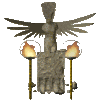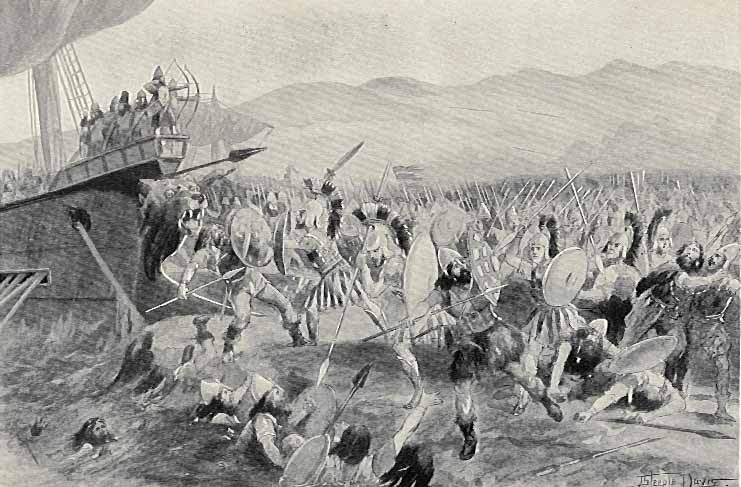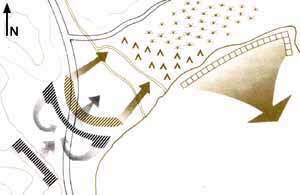|
|
|
 The
Battle of Marathon
The
Battle of Marathon

The battle of Marathon, 490 BC
In 490 BC the Persian fleet crossed the Egeian Sea once more in order to punish Athens and Eretria for their interference in the Ionian revolt. Eretria was the smallest and by far the weakest of the two cities and was soon taken by the massive Persian army. After this the Persian army landed at the northwest coast of Attica, in the plains of Marathon. The sad news about Eretria had already reached every city in Hellas and the citizens of Athens knew that the Persians would attack them next. Quickly their army had installed itself in the foothills near the village of Marathon. Six hundred hoplites of Plataea, a faithful ally of Athens, joined this army and together they controlled the road that curved around the southern side of the mountain Pentelikos towards Athens.
The commanders
The Persians were commanded by their high king Darius who had proven himself to be a worthy leader of the vast Persian empire. However, like every high king he was more of an organizer than a general. The real strength of the Persian kings was their skill to organize an enormous empire, to keep it together, and to raise and maintain large armies. Their generals were often more suited for the battlefield, but nevertheless insisted that the kings led the army.
Miltiades led the Greeks into battle. His uncle, who had the same name, had become king of a tribe of barbarians in the Chersonese in Thrace. Miltiades had managed to come to the throne after the death of his uncle, but he was no longer welcome in Thrace after the Persians had conquered it. He fled to Athens and became one of the ten strategos who were responsible for the policy of the city. In this position he managed to convince the polemarch Kallimachos that they had to face the Persians in an open battle instead of waiting for them to arrive at the walls of Athens. Miltiades was not only a very capable general, he also had a personal score to settle with the Persians.
Phase one: the eve of destruction
| The Battle of Marathon |
| Persians |
Greeks |
|
Hoplites |
| 20,000 |
9,600 |
|
Cavalry |
| 5,000 |
None |
|
Fleet |
| 200 Triremes 400 Transports 40,000 Crew |
None |
The armies installed themselves and prepared for battle. However, the first few days nothing happened. The Greek who were outnumbered eagerly waited for the Spartan reinforcements. The runner Feidippides had ran the 245 kilometers between Athens and Sparta in only two days and had begged the Spartan kings to send reinforcements to Marathon. Sparta had promised to send their army towards Marathon but their religion forbid them to move before the moon was full. The Persians on their turn did not want to force a battle as they had come to Hellas to destroy Athens instead of fighting far from this city. They also hoped that Athens would fall by betrayal. Miltiades believed that there were two possibilities: the Persians would attack Athens from the sea while its army was kept busy at Marathon, or the Greek army would be destroyed at Marathon and the Persians would attack Athens from the land. However, the Persian army was so much larger than the Greek one that a combination of both tactics was also possible.
Phase two: the battle

Miltiades must have felt the Persian hesitation and he
decided to risk a frontal attack. He had chosen the moment very well as just at
that moment the Persians had made a decision: a part of their army would sail
off to Athens and attack it while the remaining part of their infantry would
attack the Greek army and pin them down so that they could not retreat to
Athens. The Persian cavalry and a part of their infantry was loaded on the ships
and they just sailed off when the Greeks attacked. The Greeks knew that they had
to win this battle when they saw the Persian ships depart, and immediately
attacked the advancing Persian infantry. Before the Greek army crashed into the
Persian army the Greek hoplites had charged for over a mile in a closed
formation with an equipment of 32 kilograms. This shows how well the Greeks were
trained.
The wings of the Greek army were reinforced by Miltiades as he had expected the Persian cavalry to form the wings of the Persian army. But now the strong Greek wings did not face the feared cavalry but primitive tribes and Ionian Greek conscripts. The motivation of these forces was not very high and their equipment was inferior to those of the Greek hoplites who were well trained and fought for the survival of their loved city. Soon the Persian wings were totally swept away by the Greeks and the survivors retreated towards the Persian camp and ships.

However, by putting the emphasis on the wings Miltiades had
to decrease the strength of the center. They had to fight the elite of the
Persians and while the Persian wings were retreating their center managed to
break through the Greek phalanx. At this decisive moment of the battle the Greek
discipline was the winning factor. Communication was very difficult in the heat
of the battle and often forces hunted down a fleeing army as it was an easy
prey. The Greek wings did not pursue the retreating Persian wings though, but
instead they moved backwards and attacked the Persian center that had broken
through the Greek defenses. At the same time the Greek center had turned around,
completing the surrounding of the Persian army. The Persian formation collapsed
and many of them were killed. Others managed to get away and ran towards their
ships in the hope of leaving the battlefield alive. This time the Greeks did
follow them and they even attacked the ships. They managed to take seven of
them, but they had to give up their closed formation and the sight of the
fleeing Persians made them most likely a bit more reckless as now the crew of
the Persian fleet also got involved in the battle.
Phase three: the Persian army retreats
Every man in Athens prepared himself to fight for the life of his city while the Greeks left part of their infantry behind at Marathon to guard the battlefield. The Spartans arrived just in time to congratulate the Athenians with their miraculous victory. The rest of the Athenian army marched towards Athens over a distance of 33 kilometers, with full equipment. When the Persian fleet finally arrived at Athens they saw that the same army who had defeated them at Marathon was waiting for them. The Athenians had arrived only an hour before the Persians did.
The results of this battle
The Persian losses are estimated on 5400 men, of whom many drowned in an attempt to reach their ships. The Greek losses were only 192 men, but among them was their polemarch Kallimachus who was killed during the attack on the Persian ships. Obviously the Persians had enough losses as they turned around and sailed back to their homeland. Two single Greek cities had humiliated the mighty Persian empire.
If you have any questions or comments feel free to e-mail me.
Senior Project : 2001-2002 The Great Persian Empire Website